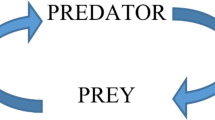Abstract
Proponents of meaning holism often invoke notions of meaning similarity and semantic spatiality in order to counter accusations that holism renders language unstable and chaotic. However, talk of such notions often falls short of being explicit and formal. In this paper I present an algebraically couched theory of inferential similarity and spatiality, motivated by measurement theory, and I apply it to the discussion of meaning holism. I argue that the proposed theory offers new and improved conceptual resources for facing the challenges raised against the thesis.
Similar content being viewed by others
References
Block, N. (1986). Advertisement for a semantics for psychology. Midwest Studies in Philosophy, 10, 615–678.
Brandom, R. (1994). Making it explicit. Cambridge: Harvard.
Brandom, R. (2007). Inferentialism and some of its challenges. Philosophy and Phenomenological Research, 74, 651–676.
Churchland, P.M. (1993). State space semantics and meaning holism. Philosophy and Phenomenological Research, 3, 667–672.
Churchland, P. (1979). Scientific realism and the plasticity of mind. Cambridge: Cambridge University Press.
Churchland, P.M. (1998). Conceptual similarity across sensory and neural diversity: the Fodor/Lepore challenge answered. Journal of Philosophy, 95, 5–32.
Davidson, D. (1984). Radical interpretation. In D. Davidson (Ed.), Inquiries into truth and interpretation (pp. 125–139). Oxford: Clarendon Press.
Davidson, D. (2004). The problem of objectivity. In D. Davidson (Ed.), Problems of rationality (pp. 125–139). Oxford: Clarendon Press.
Díez, J.A. (1997). A hundred years of numbers: an historical introduction to measurement theory 1887-1990. Part I: the formation period. Two lines of research: axiomatics and real morphisms, scales and invariance. Studies in History and Philosophy of Science, 28, 167–185.
Dresner, E. (2002). Holism, language acquisition and algebraic logic. Linguistics and Philosophy, 25, 419–52.
Dresner, E. (2004). Over-assignment of structure. Journal of Philosophical Logic, 33, 467–80.
Dresner, E. (2006). A measurement theoretic account of propositions. Synthese, 153, 1–22.
Dresner, E. (2010). Language and the measure of mind. Mind and Language, 25, 418–39.
Dresner, E. (2014). Decision theory, propositional measurement, and unified interpretation. Mind, 123, 707–732.
Fodor, J., & Lepore, E. (1992). Holism: a shopper’s guide. Oxford: Basil Blackwell.
Fodor, J., & Lepore, E. (1999). All at sea in semantic space: Churchland on meaning similarity. Journal of Philosophy, 96, 381–403.
Jackman, H. (1999). Moderate holism and the instability thesis. American Philosophical Quarterly, 36, 361–9.
Jonsson (2014). Semantic holism and language learning. Journal of Philosophical Logic, 43, 725–59.
Krantz, D., Luce, D., Suppes, P., Tversky, A. (1971). Foundations of measurement (Vol. 1–3). New York: Academic Press.
Matthews, R. (2007). The measure of mind. Oxford: Oxford University Press.
Pagin, P. (1997). Is compositionality compatible with holism? Mind & Language, 12, 11–33.
Pagin, P. (2006). In E. Lepore, & B. Smith (Eds.), Meaning holism, (pp. 213-232). Oxford: Oxford University Press.
Quine, W.V. (1951). Two dogmas of empiricism. Philosophical Review, 60, 20–43.
Quine, W.V. (1960). Word and object. Cambridge: MIT Press.
Sagi, G. (2014). Formality in logic: from logical terms to semantic constraints. Logique et Analyse, 227, 259–276.
Sellars, W. (1953). Inference and meaning. Mind, 62, 313–38.
Shapiro, S. (2006). Vagueness in context. Oxford: Oxford University.
Swoyer, C. (1991). Structural representation and surrogative reasoning. Synthese, 87, 449–508.
Tiffany, E. (1999). Semantics San Diego style. Journal of Philosophy, 96, 416–29.
van Benthem, J. (1994). Modal foundations for Predicate Logic. Report No. CSLI-94-191. Stanford: CSLI.
Warfield, T. (1993). On a semantic argument against conceptual role semantics. Analysis, 53, 298–304.
Acknowledgments
I am grateful to Eliran Haziza for his comments and help, and also to the anonymous reviewers of the Journal of Philosophical Logic. This research was supported by the Israeli Science Foundation (Grant No. 610/2016).
Author information
Authors and Affiliations
Corresponding author
Rights and permissions
About this article
Cite this article
Dresner, E. Holism, Meaning Similarity and Inferential Space—a Measurement Theoretic Approach. J Philos Logic 48, 611–630 (2019). https://doi.org/10.1007/s10992-018-9487-9
Received:
Accepted:
Published:
Issue Date:
DOI: https://doi.org/10.1007/s10992-018-9487-9




